by Rachel Talen
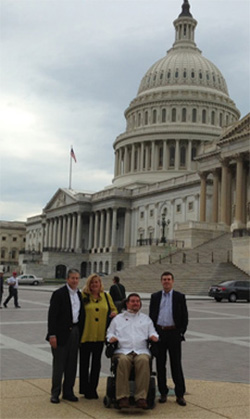 I’m pleased to present Part 1 of 2 guest posts by our former Adult Representative Ben Trockman. Ben recently returned from a trip to Washington, D.C. where he met with legislators and members of the disability community in his mission to make airline travel more accessible. Ben’s diary originally appeared on his blog, Ben’s Opinions. Check it out!
I’m pleased to present Part 1 of 2 guest posts by our former Adult Representative Ben Trockman. Ben recently returned from a trip to Washington, D.C. where he met with legislators and members of the disability community in his mission to make airline travel more accessible. Ben’s diary originally appeared on his blog, Ben’s Opinions. Check it out!
My D.C. Travel Diary, Part 1
by Ben Trockman
Sunday, May 12th
Early on Mother’s Day Sunday, my family and I finished loading up the coolers, packed the cars full of our favorite road trip snacks and set out for our trip to Washington, D.C. Our mission to spread the word of the necessity of increased accessibility of airline travel for individuals with disabilities had commenced.
After somewhere around a 12-hour drive, traveling the length of the Bluegrass State, rolling and bending back and forth through the hills of West Virginia and a short trip through Maryland, we finally made it to our hotel, the Crowne Plaza Hamilton in the nation’s capital, about 10:00 p.m.
Monday, May 13th
We planned the trip in a way that we had a free day between Sunday, the travel day and Tuesday and Wednesday, which was jam-packed full of meetings. So, my family and I had the opportunity to meander through D.C., taking in the sights of the beautiful monuments and centuries-old government buildings — my personal favorite being the nation’s Capitol building.
After seemingly walking halfway around Washington, DC taking in the sights, my family and I decided to end the evening a bit early. The plan was to meet Jennifer Dexter, the VP of Government Relations at Easter Seals at 10:30 the next morning at the Easter Seals D.C. Headquarters (which, luckily for us was only a block away from our hotel) to prepare and discuss our schedule for the big first-day.
Ever since I came up with this “harebrained” idea of improving airline accessibility, Easter Seals has taken strong interest. They have been there every step of the way, including the hard work of Jennifer Dexter, who arranged most all of the meetings while in DC.
Tuesday, May 14
The first meeting on Tuesday was with Kelly Buckland, who is the CEO of the National Council on Independent Living. Kelly as a quadriplegic, as well and he provided an extensive background of information on some of his involvement/mishaps with the airlines. Kelly also gave us a few different contacts with whom he has made over the years that I believe will be truly beneficial for our efforts in the future — a good start to our day.
We then loaded on the Metro and headed towards Rep. Susan Brooks (IN) office in the Longworth House building. We were honored to have Rep. Brooks present at the meeting. Rep. Brooks is truly a lovely and down to earth person. After pitching my proposal, we had a very substantive conversation full of interaction. In fact, she suggested connecting us with someone at Boeing to delve deeper into the issue.
After about a 45-minute conversation with Rep. Brooks, we headed to the Senate side of the Capitol to meet with Katie Campbell in the office of Sen. Joe Donnelly (IN).
Our meeting with Ms. Campbell was a bit shorter, and not quite as interactive as what we had with Rep. Brooks, but still a good meet. It was a bit of a strange meeting, being that Sen. Donnelly has not yet moved into his permanent office. So, I had to meet with Ms. Campbell in the hallway outside of the Senators temporary office; although, it was a lovely hallway.
The final meeting of the day was with Rep. Larry Bucshon (IN). When entering his office, I was very surprised to see that he was sitting right there behind the door. We did not expect the congressman to be present for the meeting, although I am extremely glad that he was present.
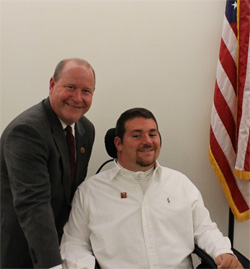 Rep. Bucshon is on the Transportation and Infrastructure Committee, therefore he was able to provide some extensive background information and also tell us a bit about what he thought was the appropriate way to continue forward; the possibility of amending the Air Carrier Access Act, among many other ideas.
Rep. Bucshon is on the Transportation and Infrastructure Committee, therefore he was able to provide some extensive background information and also tell us a bit about what he thought was the appropriate way to continue forward; the possibility of amending the Air Carrier Access Act, among many other ideas.
That was probably our best meeting of the day, the congressman showed a lot of interest, and I truly believe he will be a great ally in our future. He even took the time to snap a few photos before the end of his day; we left his office a little after 5:00 p.m.
Stay tuned for our next blog post, in which we’ll share Part 2 of Ben’s D.C. Travel Diary, and his second day of meetings with legislators and policy makers in Washington, D.C.
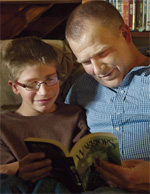 The article below was featured in our May eNewsletter. We love sharing Easter Seals news, so if you’d like to receive our eNews every month, sign up here.
The article below was featured in our May eNewsletter. We love sharing Easter Seals news, so if you’d like to receive our eNews every month, sign up here.






 I’m pleased to present Part 2 of former adult representative Ben Trockman’s D.C. visit diary. Ben recently returned from a trip to Washington, D.C. where he met with legislators and members of the disability community in his mission to make airline travel more accessible.
I’m pleased to present Part 2 of former adult representative Ben Trockman’s D.C. visit diary. Ben recently returned from a trip to Washington, D.C. where he met with legislators and members of the disability community in his mission to make airline travel more accessible. I’m pleased to present Part 1 of 2 guest posts by our former Adult Representative
I’m pleased to present Part 1 of 2 guest posts by our former Adult Representative  Rep. Bucshon is on the Transportation and Infrastructure Committee, therefore he was able to provide some extensive background information and also tell us a bit about what he thought was the appropriate way to continue forward; the possibility of amending the Air Carrier Access Act, among many other ideas.
Rep. Bucshon is on the Transportation and Infrastructure Committee, therefore he was able to provide some extensive background information and also tell us a bit about what he thought was the appropriate way to continue forward; the possibility of amending the Air Carrier Access Act, among many other ideas. I wanted to share with you a wonderful success story about one of the children receiving services from our autism services. Zach is a 10 year old boy, who started shortly after autism program began and has made HUGE gains. He is now in a mainstream classroom with less need for special education services.
I wanted to share with you a wonderful success story about one of the children receiving services from our autism services. Zach is a 10 year old boy, who started shortly after autism program began and has made HUGE gains. He is now in a mainstream classroom with less need for special education services. 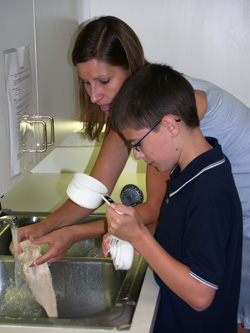 Editor’s Note: Sara’s post originally appeared on the
Editor’s Note: Sara’s post originally appeared on the  My fabulous Marketing & Corporate Relations intern, Kelly Zatlin’s internship may be over, but she still had one more blog post to share.
My fabulous Marketing & Corporate Relations intern, Kelly Zatlin’s internship may be over, but she still had one more blog post to share.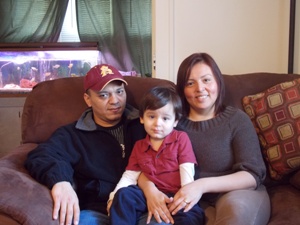 We often get calls here at
We often get calls here at